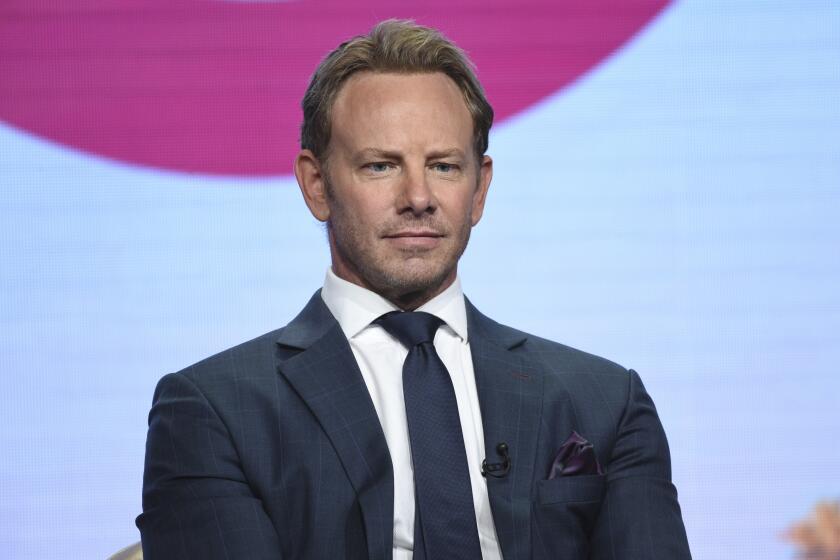Yes, She’s a Hit (Get Over It!)
You wouldn’t want to swap places with the guy for anything in the world. As he stands before Judge Judith Sheindlin, he almost seems to be trembling under the onslaught of her words.
This middle-aged man has come to Sheindlin’s court as a plaintiff. He and his fiancee, the defendant, have broken off their engagement, and he wants his ring back. But in court it emerges he may never have seriously intended marriage; he admits having remarked to another couple, “Why buy the cow when you can get the milk for free?”
Big mistake.
Judge Judy, eyes narrowed, shoulders stiffened and glowering ferociously, lets him have it with both barrels: “Not a nice thing to say, sir!” Her shouted words ricochet off the walls of the fake courtroom. The guy is having his day in court, but it’s turning out to be a really bad one.
On the other hand, it’s a good case for Judge Judy, allowing her to deliver a short lecture about the need for decent behavior in the course of ruling on a civil case. Just what the millions of viewers who tune into her syndicated daytime court TV show like to see.
“Contractually, that case was easy for me,” she said during a break in taping at Hollywood’s KTLA studios. “She [the fiancee] said it: He gave me the ring as a sop. It was to get her off his back, to buy time. So in his mind that ring was not given with the intention to marry. He made it easier for me with that comment about the cow, but that was really saying the same thing.” She shrugged ruefully. “I’ve known guys like that.”
Notch up another success for Judge Judy, who in three short years has become a national phenomenon, along the way breathing new life into a TV genre that, like the original “People’s Court,” had grown dusty with age.
In 1996, she retired after 14 arduous years as a real judge, hearing cases in Manhattan family court, to preside over real-life cases in her own reality courtroom show on TV.
To call her show a hit would be grave understatement; broadcast daily with penetration in 98% of the U.S., it has recently started to command a bigger audience share than its more famous major daytime rivals, “Oprah” and the “Jerry Springer Show.”
“Judge Judy” now has some 7 million viewers in an average week, a 39% increase over last year; this figure narrowly edges Springer. In February’s sweeps, “Judge Judy” even beat “Jeopardy!,” daytime TV’s perennial No. 2 behind “Wheel of Fortune.” Syndicated court shows in general (including “Judge Joe Brown” and “Judge Mills Lane”) are enjoying a surge of popularity, but none have the heat of “Judge Judy.”
In England, it’s a cult hit. “Judge Judy” can be seen at 2 a.m. once a week on ITV, one of the big five channels, and no less than four times a day on Live TV, a distinctly low-budget cable channel with strong emphasis on shows with sexual content. (Live TV became infamous in Britain as a channel that broadcast topless women playing darts for its sports offering, and having a shapely young blond woman in a bikini announce the weather . . . in Norwegian.) Live TV has a minuscule audience, but occasionally one meets a British Judge Judy devotee who can quote her catch phrases. But it’s a lonely business being a Judge Judy fan in the UK, where she has none of the currency of Springer or Oprah.
However, in her three years on the air in the U.S., Sheindlin’s candor has made her a household name, with a calling card of “justice with an attitude.” “Take a pill and get over it!” she snaps at whining litigants. She has been known to point to her forehead and ask a defendant: “Look at me sir! Does it say ‘stupid’ here?” And she rules her courtroom rigidly: “I’m the boss, applesauce!” she exclaims to anyone who dares interrupt.
On this particular day in her court, she had a case with an estranged mother and daughter on opposing sides. Their mutual hostility was evident, but Sheindlin quickly asserted control.
“I’m speaking!” she yelled when they started arguing. And later, to the mother: “I don’t want you to speak to her! What part of that don’t you understand?”
Such rasping put-downs have found their way into the American vernacular. Everyone, it seems, has their own favorite Judge Judy-isms--college kids, grandmothers, gay men, high school students. And Sheindlin’s fame has only increased with Cheri Oteri’s piercing parody of her on “Saturday Night Live.”
Sheindlin talked about her remarkable and unexpected ascent to celebrity thoughtfully but with wry humor. On TV, you see a tiny, tanned woman of 56, with a helmet of reddish-brown hair, sharp eyes, a fiercely set jaw and a scowl, which becomes more fearsome when she peers at her court over half-moon glasses. The volume of her voice, a foghorn with a Brooklyn accent, belies her 5-foot-1 stature. But without cameras trained on her, she is softer, quieter and reflective, with a teasing wit.
Her courtroom manner and her attitude toward law and order have made her a conservative icon. But she sidesteps the issue: “I consider myself a realist. If a person won’t accept their past but uses it as an excuse for having a miserable future, someone has to shake them and say, Who’s suffering? So your mother married someone you didn’t like! So you have low self-esteem! You only have one life to live, jerk! Get it together!”
But her views on criminal law are telling: “I believe if you’re a violent criminal and you’ve established that by your conduct, you have no right to a good time when you go to jail. You’re not supposed to be beaten or tortured, but jail’s supposed to be unpleasant. You have no right to petition the courts for chunky instead of smooth peanut butter, a state-of-the-art gymnasium, a full lending library or Home Box Office. And I don’t think you should have a right to vote. So in that regard I’m conservative.
“I don’t believe in people making excuses for doing bad things. In New York I used to say, 95% of people from your community don’t rob old ladies. So if I accept the excuse that you live in the projects or your mother beat you, what about the other 95% of people who don’t do that?”
That sounds conservative, and different from the attitudes sustaining Oprah and Jerry Springer. Both those shows are rooted in the liberal notion of human perfectibility: Oprah’s guests employ therapy culture to learn to like themselves, enhance their self-esteem and accept who they are; Springer’s parade of complainants from society’s margins is allowed to air grievances in full, however inadequate the views may seem.
*
In contrast, people in Judge Judy’s court who display avarice, irresponsibility, an exaggerated sense of entitlement or even bad manners are briskly dispatched. The glee felt by her viewers as she berates litigants is central to her appeal. Her softer on-camera side surfaces when children are involved. Sheindlin unhesitatingly directs often hilarious invective at erring adults whose fecklessness affects only themselves. But when kids are caught in the cross-fire, she gets quiet and serious, dispensing advice like some old-country matriarch. “A child is not a piece of meat,” she says frequently.
One estranged couple who came before her wanted to split all their possessions, including their wedding photos. Sheindlin begged them not to regard the photos as their property, but something to be held in trust for their children. “When you’re both gone, they’ll want to have those pictures all together,” she told them: an observation as kindly as it was wise.
“I felt there was something incredibly unique about her personality that would have the potential ability to put eyeballs in front of the set,” said Larry Lyttle, president of Big Ticket Television, which produces her show and syndicates it here and in a growing number of international markets. “This woman gave a certain sense of brevity and audacity and a certain sense of aggressiveness, which I think was quite unique in television. Luckily that was borne out.”
The Judge Judy phenomenon is not limited to her show; she has also had two books on best-seller lists. The first, a memoir of her family court years, was “Don’t Pee on My Leg And Tell Me It’s Raining,” a favorite phrase of her father’s she once shouted at a youthful New York drug dealer who blamed his crimes on his grandmother’s death; she still barks it at irresponsible litigants. The second, a plea to American women to take responsibility for their own happiness, is called “Beauty Fades, Dumb Is Forever.” Even her enemies concede she has a way with titles.
And Sheindlin has enemies; some in America’s legal establishment dislike her brusque court manner. “I occasionally read articles where law professors complain about what they perceive to be my lack of appropriate judicial temperament,” she snapped. “I’ve heard complaints like that for 25 years. They don’t complain about the result. As far as I’m concerned, the right thing is supposed to happen at the end of a trial--however you get there.”
Her executive producer, Peter Brennan, who runs the “Judge Judy” show, thinks her candor is the key to her success: “She came after the O.J. Simpson trial. It was a good time for someone to step forward in a robe who was decisive, concise and had no time for fools. America came away from the O.J. trial thinking justice was slow, stumbling, overindulgent and interfered with too much by technical aspects of the law.”
Sheindlin herself is dismissive of the O.J. trial: “It was much too long, the judge lost control of his courtroom at an early stage. And you never get it back. The attorneys were clearly in control, so irrespective of the result, the taxpayers of California paid triple what they should have.
“I believe a trial is not a place for legal gamesmanship, posturing or theatrics, and I think we’ve lost sight of that. It’s supposed to be a search for the truth unencumbered by those trappings of nice tie, nice flowers, nice dress, what your hair looks like, are you a smooth talker? I may get there with a bit of an edge. But I get there and that’s why people watch.”
*
This single-minded determination was forged early in her childhood. Her father, Murray Blum, was a Brooklyn dentist; his wife, Ethel, ran his office. From him, Sheindlin learned the phrase “Do the right thing and the right thing usually happens to you,” which to this day she repeats like a mantra. She studied at New York University law school, became a prosecutor of child-abuse cases in Manhattan family court, married another lawyer, Ronald Levy, and had a daughter and son.
The marriage ended after 12 years over career issues, and two years later, in 1977, she wed criminal defense lawyer Jerry Sheindlin, who had three children of his own. She was appointed a family court judge and in 1986 became Manhattan family court’s supervising judge. Jerry Sheindlin also went on to become a judge and will soon follow his wife in becoming a TV judge; starting this fall, he presides over a rival show. In family court, Judy Sheindlin quickly gained a reputation for plain speaking. After she was profiled on CBS’ “60 Minutes,” Brennan, a breezy, affable Australian who once worked for Rupert Murdoch’s U.S. tabloids before producing the tabloid TV shows “A Current Affair” and “Hard Copy,” went to see her in action.
“It was apparent Judy’s always been a showman,” Brennan says. “She’s larger than life, striking in her expressions and facial movements, and extremely bright. Whether she had a full courtroom or just three people, she was performing. She simply has a bigger audience now. Her appeal is that of any great TV host: They come up with the question or conclusion that we at home are thinking, if not articulating.”
It has long been thus, according to Sheindlin’s TV sidekick, large, muscular, stern-looking Petri Hawkins-Byrd, who is bailiff of her court, as he really was for five years in Manhattan. “Even back then in her courtroom, I used to look round and think, Where’s the camera?” he recalls. Now she shares with him laconic asides or disgusted glances about hapless litigants.
*
The show’s format is simple. Five researchers in California and three more across America scour court documents for suitable small-claims cases of up to $5,000. Then producers contact the two parties to ask if they will waive their legal rights and be bound by Judge Judy’s ruling. “We vet people so they’re passionate and articulate,” Brennan says. “This is daytime TV, so we don’t want drug-dealing, whoremongering or sleaze. And Judy can turn down any case she doesn’t want.”
Sheindlin confirmed this: “I get cases faxed to me (at home in New York) and if a complaint tells of psychiatric history, I don’t want to do it. Or if a parent isn’t smart enough to know not to bring his teenage daughter on the show to complain some guy gave her a venereal disease, I’m going to be smart enough to say: I’m not doing that case.”
“Our biggest challenge is to find litigants who do not resemble sleazy talk-show guests,” Brennan says. “It’s bad for advertisers. The big fear is one of these new [court TV] shows will taint the whole genre. We don’t want screaming matches or fights.”
“Her function as a family court judge was not to make things worse. It’s the same here. This is her name, her life, her robe, and she won’t put her reputation at risk. Hacks like me might push her to get more sensational, but you can’t make a dent.”
Yet there’s one artificial aspect about “Judge Judy”: No one appearing on it loses financially. The winning claimant receives damages from a fund set up by the show. “They’re there for all the emotions of being wronged and treated unfairly,” Brennan says. “You see the same reactions for $50 as for $5,000.”
For her part, Sheindlin knows the difference between her TV show and a real family court. “Some of these people [on the show] get intense about their problems, but they’re not going to affect someone’s whole life. The problems I used to deal with were far more complex: giving babies back to a crack-addicted mother or leaving them to be cared for by a marginal system. So now it’s much less stress.”
That’s true in quite literal terms. On her show, Sheindlin rules on eight or nine cases in an average day; she routinely got through between 30 and 50 in her family court days. She flies in to Los Angeles from her Upper East Side home in New York City one week in every month, discreetly checks into a hotel, and tends to stay in and order room service after the day’s taping.
Fame, then, has not turned her head around? She snorted derisively. “When you’ve been given the gift of celebrity, along with that comes a certain amount of responsibility. I get angry when I see the heroes of young people behaving badly. When a hero of young people overdoses and dies from cocaine and they celebrate it, something doesn’t fit there.”
Of course, it’s easier to behave more sensibly when you get famous in your 50s. But Sheindlin dismissed this notion as if lecturing a wayward litigant: “You’re supposed to behave right! I remember reading about Leonardo DiCaprio acting like a fool. Millions of young girls idolize him! He was acting like a jerk! Being a celebrity shouldn’t give you license to be a jerk.” Her whole body stiffened with indignation: “Mike Tyson!” She glowered. “Now there’s a guy who could have been a hero!”
Yet she regards her celebrity status with amused detachment: “This [show] is my life’s dessert. I won’t take it seriously. I’m smart enough to know in a year or two there’ll be another soup du jour. And I’ll be happy to have had this experience.” She gives one of her famous scowls: “I’m not going to learn tap-dancing to stay in the public eye.” *
The complete guide to home viewing
Get Screen Gab for everything about the TV shows and streaming movies everyone’s talking about.
You may occasionally receive promotional content from the Los Angeles Times.



